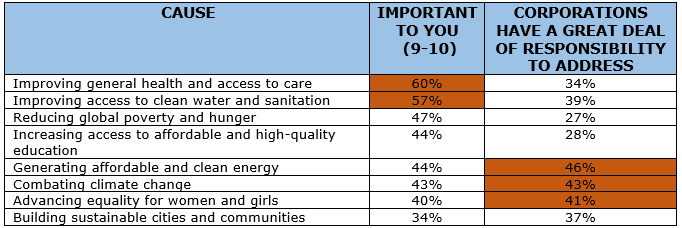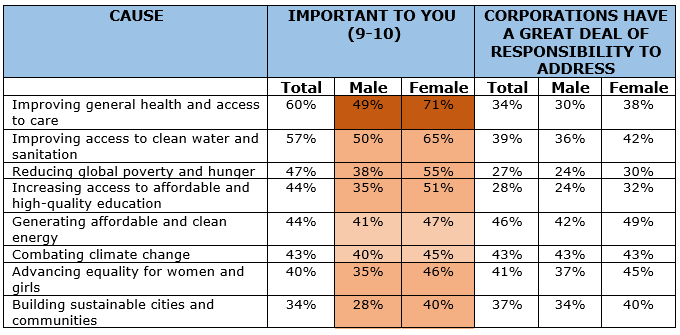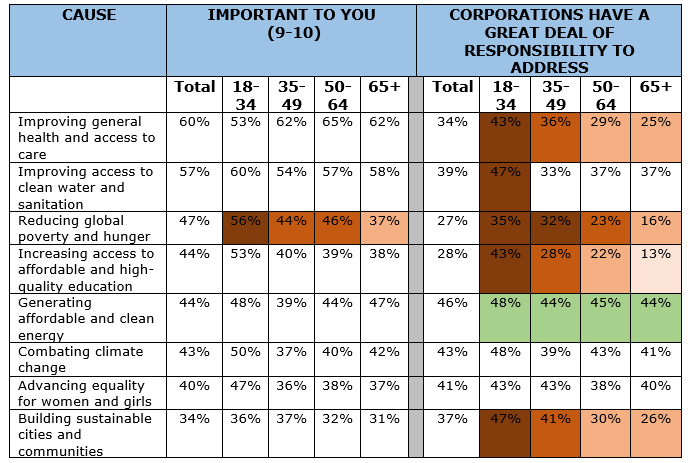The Issues That Are Important To Americans Aren’t Necessarily The Same Ones Americans Say Corporations Have An Obligation To Address
Overview
PSB Insights conducted an online survey of a representative sample of 1,000 adults nationwide from April 5-12, 2019. The survey tested the importance of a set of causes the United Nations has established as priorities for global development and the extent to which Americans believe it is the responsibility of corporations to address them.
Causes of Importance to Individuals versus Companies’ Responsibility to Address
On a series of causes which the United Nations suggests are priorities for global development, “improving general health and access to care” is the top priority, with 60% saying it is a 9 or 10 on a 1-10 scale (with 10 being most important and 1 being least important). This is followed closely by “improving access to clean water and sanitation” (57%).
But as the table below shows, Americans may believe something is important but not necessarily a top responsibility for corporations to address. This finding highlights a serious consideration that may be missed by companies when choosing which corporate social responsibility or sustainability initiatives to support. Research we have conducted shows that consumers assign responsibility based on relevance to a company’s core purpose or its ability to address it in the course of doing business.

We know from conducting dozens of surveys on issues around sustainability that the issue is a significant concern across demographic groups in America, as well as among general population audiences worldwide. The relatively low level of importance shown in the table above may be due to the lack of explanation accompanying the U.N.’s initiative. For the purposes of our survey, we wanted to stay true to the language used by the U.N., but typically sustainability initiatives, especially ones that may be ambiguous, need to have examples accompanying them. Many companies that have engaged in sustainability initiatives find the appeal to be higher when the core components, or at a minimum, the benefits, are highlighted.
Knowing the Audience for Your Cause
As the following table shows, there are considerable differences between how important issues are to women than they are to men, with women more likely than men to say a cause is very important (a 9 or 10). This is true across all causes, but the biggest difference is on the issue of health care.
The difference in attitudes between genders is quite a bit less on whether or not corporations have a great deal of responsibility to address the issue. There is no gap on the issue of climate change (43% of men and 43% of women say it is very important for corporations to address the issue). This finding shows that while women are more likely to say an issue is important to them than are men, women may not be that much more likely to expect companies to do something about it.

Differences in attitudes by age are not as clear cut. Younger Americans are more inclined to say most issues are important than are older Americans, but the differences aren’t as stark as they are by gender. However, across most issues, younger Americans are more likely than older Americans to say companies have an obligation to address it. The biggest differences are on health care, global poverty and hunger, and education and sustainable cities, with a sizeable drop-off in perceptions of responsibility from one age group to the next. Consensus is highest on generating affordable and clean energy.

INSIGHTS THAT COUNTTM
Companies considering creating, changing or expanding a CSR program to address important issues of the day should not only consider what key constituencies considered to be important, but also what expectations are for companies to address those issues.
Companies can do whatever they want in the way of good works, but if they want to use their CSR program as a “multiplier” for their brand, it is better if it is seen as compatible with their brand. Materiality research can often help companies understand the best way forward.
A note on semantics: it is important to remember that we expressly tested attitudes about obligations of companies and not just what Americans want companies to focus on. A failure to meet expectations is likely to be more damaging to reputation than a failure to meet a want or desire.
If a company does want to build affinity with particular segments of the population, it may be worthwhile to explore the salience of the issue with that particular audience, as there is considerable variability in issue priorities across demographic groups.
Finally, language matters. While terms like “sustainable” and “equality” may be well understood in the world of issue advocacy, they may be more ambiguous and freighted with ideological passions among broader audiences.
Scott Elder is Senior Vice President in PSB’s New York office. For more information on this study, you can contact Scott at selder@psbinsights.com.